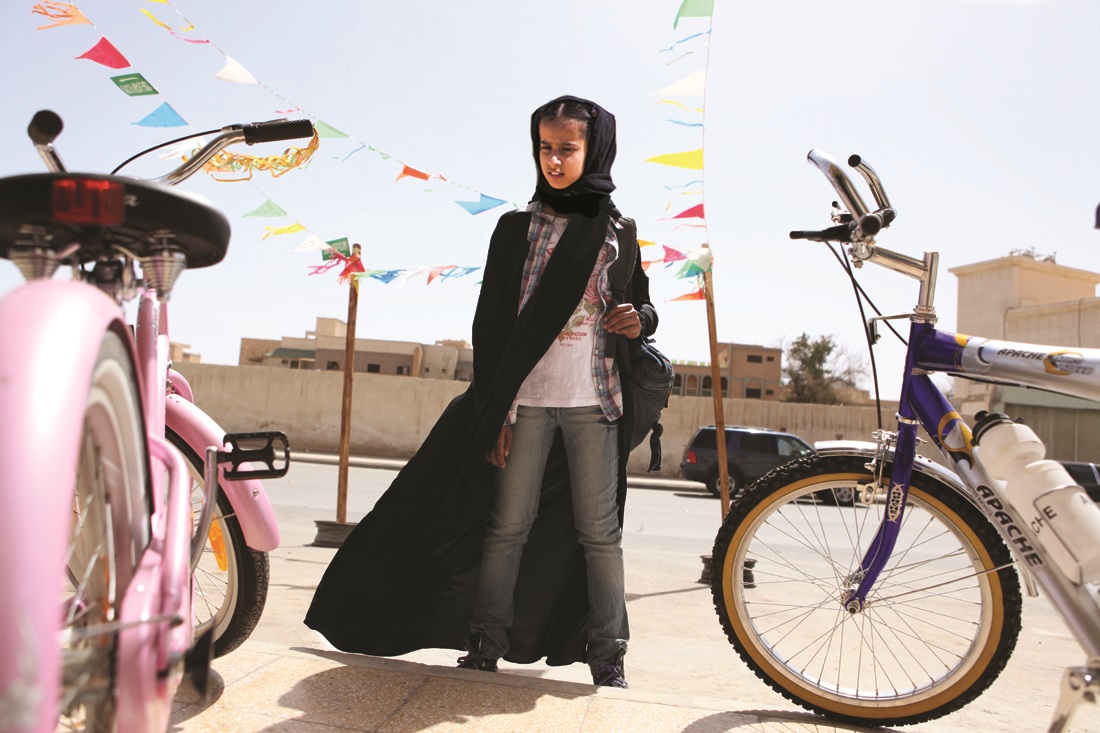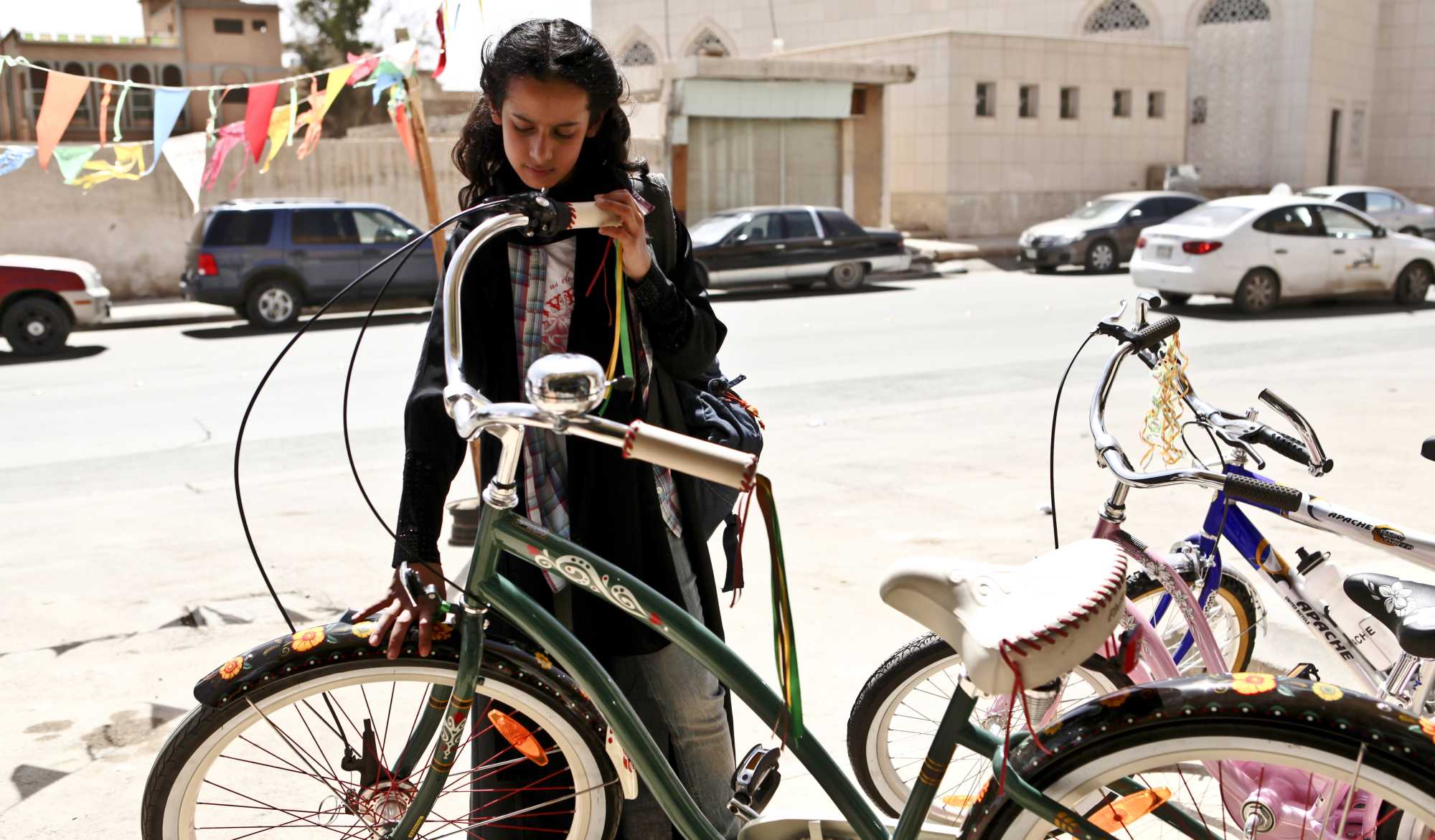This guest post written by Sarah Mason appears as part of our theme week on Women Directors.
Haifaa al-Mansour casts an eye onto the complexity of navigating an autocratic patriarchal society in Wadjda (2012). This bold voice from Saudi Arabia continues to empower voices globally.
I first watched Wadjda in the United Arab Emirates and revisited the film this year. In 2009, I was working for the Middle East International Film Festival in Abu Dhabi, the same year the Shasha screenwriting grant was awarded to Haifaa al-Mansour for Wadjda.
At the cusp of adolescence, 10 year old Wadjda (first-time actor Waad Mohammed) enjoys the fleeting freedoms of her youth. She wears the quintessential American Chuck Taylor shoes with bright laces that allow her to run to school alongside a male friend; a small freedom that will be further limited as she grows into her adolescence.
Her colourful hairclips are a small statement of individuality, and her shayla is causally placed over her hair, often falling down, blowing in the wind, sometimes lost on the way to school, snatched teasingly by her young friend Abdullah. The frivolity with which Wadjda interacts with the shayla is one of nonchalance; a relationship not yet fully formed by the imposition of its more stringent usage and variations. Soon, she will have to fully conceal her hairline with a tightly pinned al-amira or khimar, and later, societal ‘norms’ will expect her face to be fully covered with the niqab.
At school, the head teacher harshly reprimands Wadjda’s elder peers for speaking too loudly. Other students, with their faces covered to avoid confrontation, scuttle past anonymously. The head teacher, Hessa, commands that it is time for Wadjda to wear full abaya for school and to replace her shoes. It is important to mention that such repression of female voices is not only within the borders of Saudi Arabia. In Turkey, the Deputy Prime Minister announced during Eid al-Fitr in 2014 that women “laughing in public” equated to “moral regression.”
At home, Wadjda compliments her mother’s singing, asking her, “Don’t you wish you were a singer?” Her mother’s sharp intake of breath reflects the audacity of the question. There is no official law banning Saudi women from singing, but it is chastised. Much like the musical bard movement that grew out of censorship in the Soviet bloc, magnitizdat, a similar movement is alive in Saudi Arabia. When the Head Teacher empties out Wadjda’s schoolbag, she finds illegal items: tapes of forbidden songs and bracelets of forbidden colours.
In the movie, Wadjda’s mother straightens her hair and applies make-up, yet as a married mother, she wears full niqab when she exits the home. She climbs into a vehicle packed with other women who need transportation to work. Her commute, her strained relationship with the impatient driver Iqbal and the perils faced by other female commuters in this forced environment, is central to her world and her phone conversations. Their fate is in his hands. Every day.
In the only country in the world that bans women from driving motorized vehicles, as decreed by hard-line clerics, this ‘ban’ does not feature in the Qur’an itself and is not written into law. If it were, why does Saudi Arabia stand alone in this inexplicable interpretation of an ancient scripture? Rotana Tarabzouni, a Los Angeles based Saudi singer, refuses to be silenced. She has already voiced her support of the Saudi Women to Drive movement and continues to garner recognition for her singing career. Activist Loujain al Hathloul defied the ban in late 2014 and drove over the border with a valid driving license, from neighboring United Arab Emirates to her home country. She was detained along with Maysaa al Hamoudi who drove from the UAE to the border to offer support. They were both arrested and held for 70 days without any charge, referred to a specialist court on charges of ‘terror’, and have since been released.
Vocal and mobile women are ‘terror’ for the patriarchs of Saudi Arabia, however, for women in Saudi Arabia, the imposition of a male driver on treacherous roads remains their ‘terror’. In 2014, Saudi artist Manal Al-Dowayan exhibited “Crash” to highlight one of the consequences of the driving ban for women. Commuting female teachers are 50% more likely to be killed in a car accident than the average Saudi. Even in notification of death, journalists kowtow to the conservative trend that avoids mentioning a women’s name in public. Tragically, these women often die faceless and nameless. Alternatively, in 2014, licensed pilots Hanadi al Hindi and Yasmeen Muhammed al Maimani became the first Saudi women awarded commercial pilot licenses and they are allowed to fly within their own country’s airspace.
Equally fixated on mobility, Wadjda has her sets her sights on purchasing a bicycle — without training wheels. She listens to rock music and braids friendship bracelets in the colours of the local soccer teams. She takes full advantage of her pre-adolescent youth, delivering hand-written notes to an older boy; where older girls cannot.
In Wadjda, inter-female relationships are strained. Wadjda and her mother argue about the bike. Her mother implores it is “haram” — not permitted. She implies that it may negatively affect her daughter’s marriage and childbearing prospects. Yet it is clear that her mother’s marriage is under siege in a state that encourages polygamy. Even Wadjda’s own grandmother threatens to be the architect of the family’s demise, by selecting other prospective partners for her son to marry. The first line of matchmaking is always a son’s mother and only men feature on the family tree.
In a bid to impress her husband, Wadjda’s mother goes shopping for a bright red dress. The two enter the toilets to try on the garment. The notion of an unclothed women in a dressing room within a mixed-gender store is not permissible in Saudi Arabia. Wadjda’s mother, in the bright red dress is harshly juxtaposed in the decaying bathroom and next to the advertisement for deodorant, where the smiling model has had an abaya block-drawn over her exposed skin. In a world where women are only and always framed within the context of men, Wadjda’s mother doesn’t ask if she looks good in the red dress. Rather, Wadjda’s mother asks, “Will my husband like it?”
With the prevailing existence of Saudi Arabian austerity, ‘rules’ and not laws of the state, undermine gender parity. Many of these ‘rules’ are excused as ‘cultural’ or ‘traditional.’ However, this ‘culture’ is espoused by hardline, wahhabist conservative male religious figures, which mute any discussion or dissent.
We, professional women the world over, do not accept culture or tradition as a rational justification for discrimination against a racial or ethnic group – rather, we would look for opportunities to challenge such prejudices. So why do we continue to accept gender-based inequality and its consequences? We do not. Citing ‘culture’ as corroboration to argument only serves to preserve aspects of a culture that maintains the proponent’s present privileged position.
The internet and increased global travel challenge the old order. Restricting what can be seen, viewed, read and dissipated is much, much harder to control in the new media age. Saudi Arabia is cautiously embracing positive international recognition in new mediums, while dancing precariously with the messaging it conveys. In 2012, the same year Wadjda was released, athletes Wojdan Shaherkani and Sarah Attar made history competing at the London Olympics as the first Saudi female Olympians. A budding art scene, a burgeoning comedy scene, and a feature film directed by a woman — and with women central to its storyline — are all exhibiting new, bold statements.
Since Wadjda’s release, Arab films have garnered more attention in the global market. Barakah Meets Barakah gently navigates young love in Saudi Arabia. The comedic short captured the imagination of Berlin Film Festival audiences who awarded several prizes to Arab films, filmmakers and actors. I write with confidence that each of the Arab filmmakers recognised at Berlinale in 2016 have seen Haifaa al-Mansour’s Wadjda.
It’s a courageous battle to challenge the norm. In a state that imposes rules based on laws unwritten, perhaps it is time to write our own rules. In Wadjda, Head Teacher Hessa proclaims to Wadjda, “Believe it or not, you remind me of myself at your age.” With the wind in her hair, a young girl dreams of the freedom that riding a bike offers so that she may take control of her direction and destination.
Four years after the release of Wadjda in 2012, there are now many more Wadjdas. They are the Haifaas, the Manals, the Rotanas, the Loujains, the Maysaas, the Hanadis, the Yasmeens, the Wojdans, and the Sarahs. They are you and they are me.
They are enrolled in higher education, writing novels and screenplays, vlogging, blogging, creating art, voicing opinions, singing songs, travelling internationally, competing in sporting events, riding bicycles and flying airplanes. They are also doing it all under existing written law, even in Saudi Arabia, and they don’t seek your approval.
See also at Bitch Flicks: ‘Wadjda’: Can a Girl and a Bicycle Change a Culture?
Sarah Mason is an international producer based in Los Angeles. A graduate of Bristol University, UK. She consults on Middle Eastern cultural representation in film and art.

